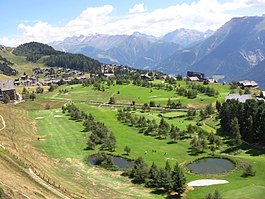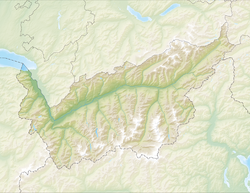Riederalp (German pronunciation: [ˈʁiːdɐʔalp]) is a municipality in the district of Raron in the canton of Valais in Switzerland. It was created in 2003 through the merger of Goppisberg, Greich and Ried-Mörel.[3]
Riederalp | |
|---|---|
 | |
| Coordinates: 46°23′N 8°2′E / 46.383°N 8.033°E | |
| Country | Switzerland |
| Canton | Valais |
| District | Raron |
| Area | |
• Total | 21.04 km2 (8.12 sq mi) |
| Elevation | 1,905 m (6,250 ft) |
| Population (31 December 2018)[2] | |
• Total | 452 |
| • Density | 21/km2 (56/sq mi) |
| Time zone | UTC+01:00 (Central European Time) |
| • Summer (DST) | UTC+02:00 (Central European Summer Time) |
| Postal code(s) | 3987 Riederalp 3983 Goppisberg, Greich 3986 Ried-Mörel |
| SFOS number | 6181 |
| ISO 3166 code | CH-VS |
| Surrounded by | Betten, Bitsch, Filet, Mörel, Naters, Termen |
| Website | riederalp SFSO statistics |

Geography
editRiederalp has an area, as of 2011[update], of 21 square kilometers (8.1 sq mi). Of this area, 27.7% is used for agricultural purposes, while 42.0% is forested. Of the rest of the land, 3.0% is settled (buildings or roads) and 27.3% is unproductive land.[4]
The mid-mountain resort sits on a south-facing terrace, south of the 23 km (14 mi) long Aletsch Glacier—Europe's largest, in the Bernese Alps. The altitude of the village (1,930 m [6,330 ft]) allows good view of the Pennine Alps with some of its highest summits such as the Fletschhorn, Dom and Matterhorn.
Demographics
editRiederalp has a population (as of December 2020[update]) of 438.[5] As of 2008[update], 10.6% of the population are resident foreign nationals.[6] Over the last 10 years (2000–2010 ) the population has changed at a rate of -3.9%. It has changed at a rate of -3.9% due to migration and at a rate of 3.6% due to births and deaths.[4]
Most of the population (as of 2000[update]) speaks German (95.6%) as their first language, Serbo-Croatian is the second most common (1.9%) and French is the third (0.8%).[4]
As of 2008[update], the population was made up of 479 Swiss citizens and 57 non-citizen residents (10.63% of the population).[6] As of 2000[update], children and teenagers (0–19 years old) make up 23.9% of the population, while adults (20–64 years old) make up 59.4% and seniors (over 64 years old) make up 16.7%.[4]
As of 2009[update], the construction rate of new housing units was 9.3 new units per 1000 residents.[4] The vacancy rate for the municipality, in 2010[update], was 1.33%.[4]
Sights
editThe entire villages of Goppisberg and Greich are designated as part of the Inventory of Swiss Heritage Sites.[7]
Politics
editIn the 2007 federal election the most popular party was the CVP which received 69.21% of the vote. The next three most popular parties were the SVP (13.12%), the FDP (9.33%) and the SP (6.95%). In the federal election, a total of 290 votes were cast, and the voter turnout was 69.4%.[8]
In the 2009 Conseil d'État/Staatsrat election a total of 269 votes were cast, of which 20 or about 7.4% were invalid. The voter participation was 68.3%, which is much more than the cantonal average of 54.67%.[9] In the 2007 Swiss Council of States election a total of 288 votes were cast, of which 17 or about 5.9% were invalid. The voter participation was 72.9%, which is much more than the cantonal average of 59.88%.[10]
Economy
editAs of 2010[update], Riederalp had an unemployment rate of 2%. As of 2008[update], there were 62 people employed in the primary economic sector and about 18 businesses involved in this sector. 9 people were employed in the secondary sector and there were 4 businesses in this sector. 239 people were employed in the tertiary sector, with 37 businesses in this sector.[4]
In 2008[update] the total number of full-time equivalent jobs was 240. The number of jobs in the primary sector was 24, all of which were in agriculture. The number of jobs in the secondary sector was 8, all of which were in construction. The number of jobs in the tertiary sector was 208. In the tertiary sector; 21 or 10.1% were in wholesale or retail sales or the repair of motor vehicles, 11 or 5.3% were in the movement and storage of goods, 131 or 63.0% were in a hotel or restaurant, 1 was the insurance or financial industry, 2 or 1.0% were in education.[11]
Of the working population, 28.9% used public transportation to get to work, and 20.9% used a private car.[4]
Education
editDuring the 2010–2011 school year there were a total of 21 students in the Riederalp school system. The education system in the Canton of Valais allows young children to attend one year of non-obligatory Kindergarten.[12] During that school year, there was one kindergarten class (KG1 or KG2) and 7 kindergarten students. The canton's school system requires students to attend six years of primary school. In Riederalp there were a total of 2 classes and 21 students in the primary school. The secondary school program consists of three lower, obligatory years of schooling (orientation classes), followed by three to five years of optional, advanced schools. All the lower and upper secondary students from Riederalp attend their school in a neighboring municipality.[13]
Sport
editBeginners and intermediate skiers have the bulk of the 30 km (19 mi) of pistes, while expert skiers and snowboarders have a choice of off-piste at the top of the mountain.
Riederalp is a traffic-free village (cable car access) with a small number of permanent residents who are dwarfed by the influx of in-season tourists. Seven ski lifts operate over the 30 km (19 mi) of Riederalp and adjoining Bettmeralp's slope. In addition, there are 19 km (12 mi) of cross-country trails.
There are about 25 km (16 mi) of winter walking paths around the village. There is also a sports centre, and an indoor swimming pool at Bettmeralp.
Skilift system
editRiederalp can be reached via two Aerial tramways or Gondola lifts from Mörel. The main Ski lifts are:[14][15]
| Name | Type | Elevation Ground Station |
Elevation Mountain Station |
Slope Length | Capacity Persons/Hour |
Construction Year |
|---|---|---|---|---|---|---|
| Mörel Ried-Mörel |
Aerial tramway | 759 m (2,490 ft) | 1,200 m (3,900 ft) | 1,037 m (3,402 ft) | 700 | 1996 |
| Ried-Mörel Riederalp |
Gondola | 1,200 m (3,900 ft) | 1,951 m (6,401 ft) | 1,980 m (6,500 ft) | 700 | 1987 |
| Mörel Riederalp |
Aerial tramway | 759 m (2,490 ft) | 1,950 m (6,400 ft) | 2,798 m (9,180 ft) | 500 | 1974 |
| Moosfluh | Gondola | 1,886 m (6,188 ft) | 2,335 m (7,661 ft) | 1,798 m (5,899 ft) | 2200 | 1995 |
| Riederfurka | Chairlift | 1,876 m (6,155 ft) | 2,119 m (6,952 ft) | 702 m (2,303 ft) | 2050 | 1991 |
| Hohfluh | Chairlift | 1,929 m (6,329 ft) | 2,227 m (7,306 ft) | 1,010 m (3,310 ft) | 1090 | 1977 |
| Golmenegg | Surface lift | 1,954 m (6,411 ft) | 2,100 m (6,900 ft) | 906 m (2,972 ft) | 900 | 1970 |
| Alpenrose 1 | Surface lift | 1,903 m (6,243 ft) | 1,935 m (6,348 ft) | 179 m (587 ft) | 1000 | 1980 |
| Alpenrose 2 | Surface lift | 1,903 m (6,243 ft) | 1,935 m (6,348 ft) | 179 m (587 ft) | 720 | 1980 |
References
edit- ^ a b "Arealstatistik Standard - Gemeinden nach 4 Hauptbereichen". Federal Statistical Office. Retrieved 13 January 2019.
- ^ "Ständige Wohnbevölkerung nach Staatsangehörigkeitskategorie Geschlecht und Gemeinde; Provisorische Jahresergebnisse; 2018". Federal Statistical Office. 9 April 2019. Retrieved 11 April 2019.
- ^ Amtliches Gemeindeverzeichnis der Schweiz published by the Swiss Federal Statistical Office (in German) accessed 19 July 2011
- ^ a b c d e f g h Swiss Federal Statistical Office accessed 5 October 2011
- ^ "Ständige und nichtständige Wohnbevölkerung nach institutionellen Gliederungen, Geburtsort und Staatsangehörigkeit". bfs.admin.ch (in German). Swiss Federal Statistical Office - STAT-TAB. 31 December 2020. Retrieved 21 September 2021.
- ^ a b Swiss Federal Statistical Office – Superweb database – Gemeinde Statistics 1981–2008 (in German) accessed 19 June 2010
- ^ "Kantonsliste A-Objekte". KGS Inventar (in German). Federal Office of Civil Protection. 2009. Archived from the original on 28 June 2010. Retrieved 25 April 2011.
- ^ Swiss Federal Statistical Office, Nationalratswahlen 2007: Stärke der Parteien und Wahlbeteiligung, nach Gemeinden/Bezirk/Canton (in German) accessed 28 May 2010
- ^ Staatsratswahlen vom 1. März 2009 (in German) accessed 24 August 2011
- ^ Ständeratswahl 2007 (in German) accessed 24 August 2011
- ^ Swiss Federal Statistical Office STAT-TAB Betriebszählung: Arbeitsstätten nach Gemeinde und NOGA 2008 (Abschnitte), Sektoren 1-3 Archived 25 December 2014 at the Wayback Machine (in German) accessed 28 January 2011
- ^ EDK/CDIP/IDES (2010). Kantonale Schulstrukturen in der Schweiz und im Fürstentum Liechtenstein / Structures Scolaires Cantonales en Suisse et Dans la Principauté du Liechtenstein (PDF) (Report). Retrieved 24 June 2010.
- ^ Obligatorische Schulzeit (in German) accessed 24 August 2011
- ^ Interactive map Aletschgebiet Lift info Archived 16 December 2008 at the Wayback Machine. Visited 16 December 2008
- ^ Website Riedelalpbahnen Technische Informationen. Viewed 16 December 2008
External links
edit- Official Website
- Goppisberg in German, French and Italian in the online Historical Dictionary of Switzerland.
- Riederalp in German, French and Italian in the online Historical Dictionary of Switzerland.




